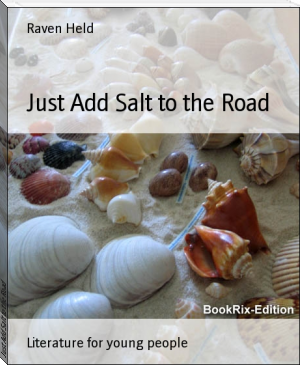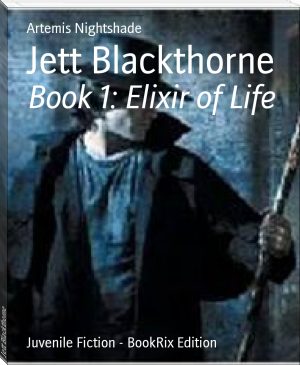Just Add Salt to the Road - Raven Held (best ebook reader for chromebook .txt) 📗

- Author: Raven Held
Book online «Just Add Salt to the Road - Raven Held (best ebook reader for chromebook .txt) 📗». Author Raven Held
Just Add Salt to the Road
It had finally turned cold. Just the way she liked it. Grey pounded on her windows, relentless and gasping, and tear tracks ran down the obscured glass.
She thought she heard a soft puttering down the driveway, like it was about to breathe its last. It reminded her of that car, the old Toyota that he was so proud of. She remembered how she used to sit in there next to him, bouncing along to some Joan Jett song, while he gripped his steering wheel tightly, as though holding his precious clunker together in case it fell apart from her bouncing. She remembered how she always had to squeeze into the passenger seat because of all the junk cluttering up the backseat: old televisions, transistor radios, and sometimes even heavy mahogany chests. And in front of her, the glove compartment was never able to be properly closed. It hung open, vomiting out its contents as a way of greeting her, even when he tried smacking it close several times for her sake.
She always thought his car embodied his soul. He had, unwittingly, infused every bit of himself into it. It was the only thing he really truly treasured, if only because it was the only thing his father gave him. He was proud of it, and took every complaint she made about it personally. So she learnt to live with its shortcomings – nothing could be perfect, after all. The air-conditioning spluttered and died every time he started the engine, and became a heater instead. That was why they always had the window down, and the radio cranked up, perhaps to compensate for the lack of that luxury. Plus, there was always a whining sound – apart from the puttering of the engine – coming from the hood, which he said was probably due to the fan belts. It grew to become their theme music, somehow.
Finally, she remembered the summer where she kept her ears peeled for that soft puttering everyday, when he fetched her to and from work, and then went off to the adventure park for work. It was the summer that she would always reach back to, whenever he was not around. It was also the summer they both would reach back to, when nothing was what it used to be anymore.
*
They went through everything like a phase: popsicles, gummy bears, pistachio ice-cream, sandcastles, seashells and other knickknacks on the beach, classical mythology, spiders for him and butterflies for her, and pop music. Each phase would have a peak, wherein they would indulge in it maximally – having potato chips for lunch and popcorn for dinner, spending the entire day at the beach, reading non-stop just so they could compare the sizes of their book-banks – and then finally, at the end of the phase, they would give up on it entirely and never revisit it again. It just got filed under Things Tried and Tested, like everything else before that.
Last year around this time, they were going through a history phase. He was more interested in the wars – World Wars and civil wars and forgotten wars – while she was more fascinated with civilisations, the rises and downfalls of every one of them.
They both agreed that it was depressing. History was nothing more than a record of the failings, cruelties and greed of men anyway, and there were better ways to die than by the petty demands and insatiable desires of those who gave themselves the right to control everyone.
“Just think,” he had said, “if Hitler had concentrated on healing Germany’s economy instead of building up an arsenal, would World War Two have even started?”
“But then if he did that,” she had pointed out, “he wouldn’t be Hitler.”
“True. Then what if he had, by chance, died in that Reichstag fire? He wouldn’t even have come to power, then.”
That was one of the things she remembered best about him, his tendency to leave things to chance, believing it had the power to alter the shape of things, to twist any plan and make everything pan out differently, that everyone were at the mercy of it. He was not one to believe things happened for a reason – he had been through enough to reject that notion – but that things happened and no amount of planning or whining could change that … until Chance struck again, of course.
Maybe that was why he was able to leave so easily. With him, it was always easy to start things over. The thing about that, however, was that it was just as easy for him to leave and never look back, accepting the new workings of chance just like he had accepted everything else.
*
Her gaze travelled to the spot of splintered glass before her. It was where the pebble he had flung had struck her bedroom window. Ragged hairline tributaries fed the explosive pool of fragile glass in the middle. A single prod and her window would shatter into a shower of old regret and words to take back.
Nothing had changed since then. At least, that was what she preferred to believe. On her part, she was still the same. He, on the other hand, had always been able to easily take the shape and shade of his surroundings. Maybe he would not remember what had taken place that night before he left anymore. He used to call her memory a steel trap. That might have sounded like a compliment, then. But now, she was beginning to think that it also hinted at a certain stubbornness, an exasperating reluctance to let go of stale memories.
But that was one memory she could not leave behind no matter how hard she tried. It stayed there, like an indelible taint on their hitherto unblemished relationship.
They were both what people would call pacifists; they had never been able to see the point in raising their voices and battling hard for what they want. So she supposed their behaviour that night was very much out of character for both of them.
She had blamed his parents. Sometimes, now, she still did. It was always easier to point fingers, after all, wasn’t it? But other times, she knew that it was him playing to the workings of Chance again. It was one of the reasons why she loved him, and why she hated him.
*
It still had not registered, the fact that he was leaving in a matter of hours. The night was still as balmy as any other night they had spent sitting on her front porch. Nothing felt changed or about to.
The only thing different was that neither of them could find anything to say. What had they always talked about before? Their usual conversation topics now seemed pointless and inane, a desperate stranglehold on normalcy and indifference to his looming departure. So they sat there, her knees drawn up close to her while his legs were stretched out before him, staring out at the pink light of dusk, together but alone. The air was still with what felt like desolation.
“It just so happened that both Mussolini and Hitler were against the Lefties,” he finally said, in a quailed voice. “If they weren’t, they wouldn’t have bonded over the Spanish Civil War. And Hitler wouldn’t have gotten away with Anschluss.”
She turned to fix a stony stare on him. “It’s your last night here, and that’s all you’re going to talk about? History?” The words sounded detached, not uttered by her, foreign words spoken through alien lips.
A silence elbowed its way between them, an unwelcome intruder that swelled shamelessly by the second. She knew he would let it balloon further; after all, what would he say? She did not even know what she wanted him to say. He did not view this as a choice, a conscious decision, but something that just came along – never mind if it got between them. That, she decided, was what she was angry with about. For once, she would like him to take control and decide, not use Chance as an excuse for his actions.
“You think I don’t know what this is about?” she ventured.
He did not answer.
“You’ve always wanted to be your dad’s son.” She was shaking, she realised, not because of her disappointed anger with him, but because neither of them had ever broached this topic before; to him, it was taboo, and she had quickly picked up on it. “And now that your dad’s gone, and your mom decides to uproot both of you and escape to someplace else where nobody knows either of you, you think she’s finally paying you some attention.”
“Shut up,” he said, shaking his head. His voice was as still as the twilight air. “You don’t know anything, so just don’t say anything.”
“Oh, you think you’re so difficult to read, don’t you?”
“I said, shut up, Ethel,” he snapped. “Please. Let’s not end it this way.”
“End what?”
“Nothing.”
She took a deep breath, deciding she had just about had it with this conversation. “Keep avoiding the truth, Kris,” she said, getting up. “Sooner or later, you’ll just realise nothing’s changed, and you’d have just made another futile attempt at repairing something that’s already broken.”
Later, when she was in her room, sitting on the window ledge, she flinched so hard she fell off it, for a dark object had come hurtling towards her face at a speed almost too quick for her to register. When she scrambled back to the window, careful not to exert any weight against it, she saw him backing out of her front yard. When their gazes met, she caught an atypical flicker of sadness in his disposition before he turned away and dashed back home, a boy trying to shake off his wounds, new and old.
It had never occurred to her, then, that the comment on Hitler and Mussolini wasn’t just about history. Sometimes, things just happened, and they just had to work their way around it to find the best way out. If she ever saw him again, that was what she would tell him. That she understood, now, what he had tried to tell her all those months ago.
*
She spent the subsequent hot months of June and July alone, sweating on her front porch, listless and restless. Something felt amiss, and she realised it was the space next to her, a gaping reminder of what was and would never be.
Words were the worst ever tools to have. With them, you were powerless. They inflicted invisible wounds, and stayed with you like red-eyed companions on your shoulders. So she resolved, from that summer on, not to say a word. One thing led to another, as they always say, and sometimes, things just happened. Sometimes, there was no way around it.
*
There was no way it could be true. But she was certain there was none other like it; no other car spluttered like that beaten-up Toyota. She heard the creak of the door as it opened and shut, and scrambled to open her window. Ignoring the reproving pelt of cold rain, she stuck her head out and squinted out into the grey oblivion. The figure was hunched in a navy blue windbreaker, the hem of his jeans soaked, as he scurried towards the house.
She was there





Comments (0)